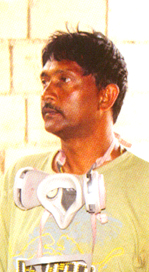Furniture maker Mohan Jangbir is an unlikely success. About five years ago, he found himself with very little and with nowhere to turn. “I had $100 in my name,” he says. His wife died after ailing for some time and the medical expenses had exhausted his savings, forcing him to end a successful trucking business.
But after years of setbacks, what Jangbir did have was an idea—a ‘rum shop,’ which he thought would be the quickest he could earn. He is now among the success stories of the Institute of Private Enterprise Development (IPED), which recently honoured him as part of its 25th anniversary celebrations.

Jangbir, who is featured in IPED’s recently-released Book of Success Stories, had his application initially turned down, since he had previously received a loan and had defaulted on payments.
His first loan, in 1986, had been for a fishing business. He had started as a vendor at age 17 at the Mon Repos market, where he sold bora and boulanger, and then watermelons, which eventually became his trade.
It was during this time that he decided to go into the fishing business and he took a loan of $75,000 from IPED. However, in the first of many setbacks he would face over the years, his crew took off with his boat, leaving him indebted to the loan agency.
A man who does not believe in “sitting there in the hot sauce,” Jangbir says he had an engine which he sold in order to pay off all his outstanding debts at IPED. This done, he resumed his watermelon business, which thrived to a point where he was earning “over $1,000,000 [a] month.”
Within two years, he purchased three trucks and was soon contracted by Banks DIH Limited, Demerara Distillers Limited and Courts Guyana Incorporated to transport products from Georgetown to outlying locations in Berbice and Linden. Jangbir’s wife, meanwhile, continued to sell watermelons at the market and all went well for a while.
However, his wife became ill and most of the money he had made went to her medical bills. When she died, both businesses had gone downhill as a result of the medical expenses and Jangbir was forced to sell the trucks. “I used to park de truck dem ’cause me nah had time fuh run behind tha, and people start thief out de parts dem,” he says.

It was at this point that Jangbir decided to open a rum shop. Swallowing his pride, he turned once again to IPED. However, with his previous arrears, he found himself placed on a “blacklist.” Nevertheless, an undaunted Jangbir pressed forward and kept returning to the loan agency until he was finally referred to the manager in Georgetown.
Jangbir recalls that the officer patiently listened to him recount all that had happened since he took the first loan for the fishing business and, the determined entrepreneur was soon granted the $300,000 loan he desired. With this sum, Jangbir was able to open the rum shop, but he soon found out that it was not as easy as it looked. “Rum shop business is a stressful business… if one man order one quarter at 11 o’ clock, yuh gat fuh keep de shop open till he done deh,” he said.
Jangbir had wanted to run a furniture business and eventually he decided to pursue his dream. Although he had no experience in carpentry or joinery, he says, “if you want fuh do business, you nah gat fuh know nutten.
All you got fuh do is get people who know fuh do de wuk and leh dem do it fuh you.” He put this into action and consulted with persons he knew to be skilled in the trade and he set up Pradeep’s Furniture Store.
Jangbir’s East Coast Demerara store supplies several large stores on the East Coast. He also set up another furniture store.
Jangbir, who has since remarried and has five children, encourages others not to give up on their dreams. He also advises that they use whatever little money they have and “turn it over.” He explains, “Don’t play big and spend it out fuh buy car and so… tha can come lata.” He believes that he has become a success because he remained humble.
He says was surprised at being honoured by IPED and especially at being the recipient of “a big trophy.” He adds, “It mek me feel high.”
Another IPED success story, Lalta Sahadeo initially started out as a fisherman. He had been in the fishing industry since he was 11 years old, but his years of labour saw little rewards.
Sahadeo, of Princeton, Corentyne, told Stabroek News that with a loan from IPED, he used the skills he learned in the fishing industry to establish himself as the “wild meat man” in Berbice.
To date, Sahadeo says he is the only person in the Skeldon area operating a wild meat business. According to him, after he received his first loan from IPED in 1996, he invested the $120,000 in procuring all types of meat and expanding his business. Today, he buys wild meat from Orealla, Siparuta and even Suriname and supplies almost all restaurants and bars located on the Corentyne Coast as well as other businesses and individuals.
A husband and father of two, Sahadeo used some of his profit to invest in a stereo set, called ‘Heartbeat’ which earns him an additional income providing entertainment for various events on the Corentyne. “Me system is deh at all them parties and so… every Old Year’s night and so. Me and my son is DJ,” the man boasted.
Sahadeo said he always repays his IPED loans faithfully and to date he has been granted five loans. “I never tek long to pay my loan. If they give me 20 month, 25 month, I pay back in 12 or 18 month,” he says.
For this reason, he believes that persons he encourages to apply for IPED loans have been given approvals.




